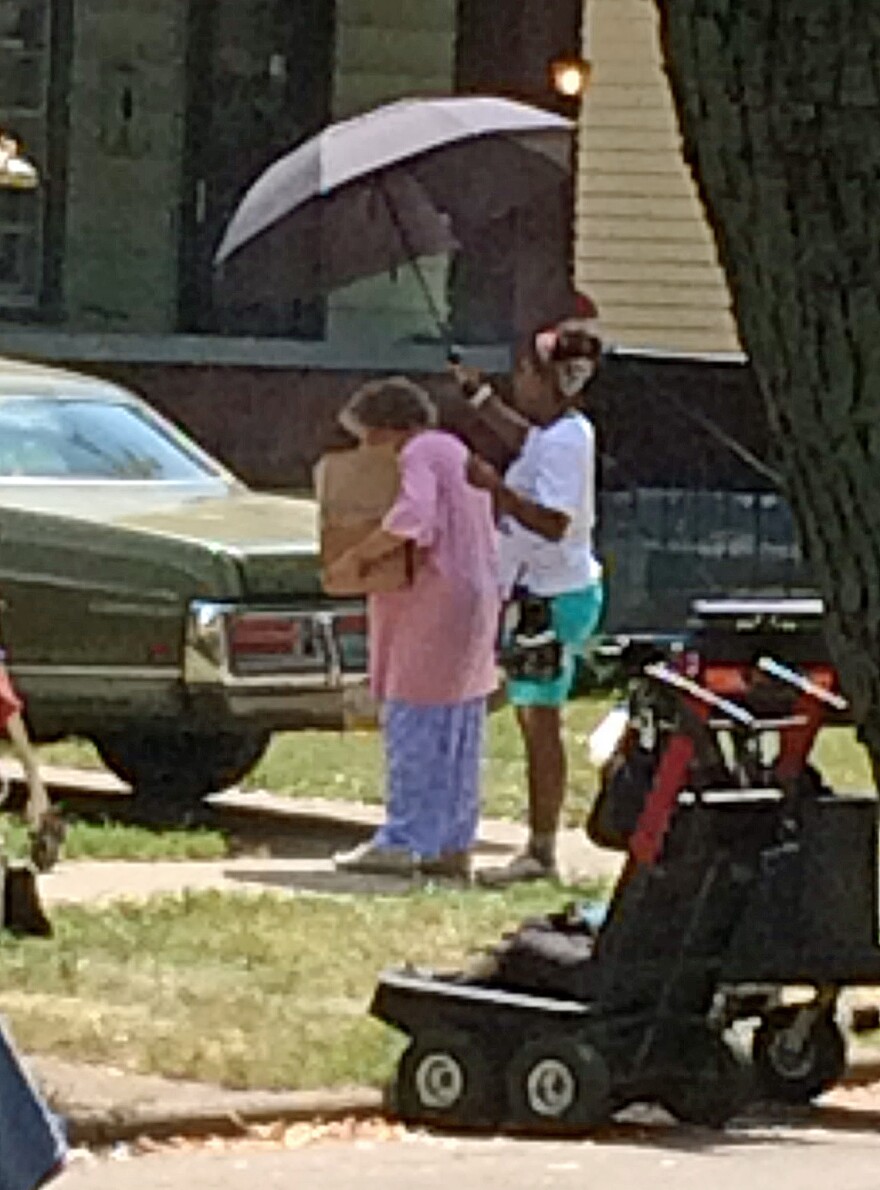When a popular book is made into a movie, you expect the story to be condensed into the Cliff's Notes version.
Not a comic book.
That's what Ron Howard did to Hillbilly Elegy, the best-selling memoir by J.D. Vance, who grew up in Middletown, Ohio. It's my hometown, too.
The Oscar-winner director and Oscar-nominated screenwriter Vanessa Taylor (The Shape of Water) stripped out Vance's exhaustive documentation of the disillusionment, detachment and sometimes discrimination felt by poor whites to focus on his very real – but over-the-top – drug addicted mother Bev (Amy Adams) and foul-mouthed, chain-smoking grandmother Mamaw (Glenn Close).

Without that subtext, we're left with the Middletown Hillbillies. But this is a drama, not a comedy, about the teenage and young adult J.D. (Owen Asztalos, Gabriel Basso) and his sister Lindsay (Haley Bennett) suffering through the consequences of their mother's and grandmother's crazy antics and failed relationships.
The story is told through multiple flashbacks, and flashbacks within flashbacks, while J.D. is away at Harvard Law School, after surviving his (not mine) hillbilly culture in Middletown, Marine boot camp, the Iraq War, and his undergraduate degree at Ohio State University. He's called home by Lindsay while interviewing for prestigious internships after their mother overdoses yet again, long after both their Mamaw and Papaw (Bo Hopkins) are dead. Hence the endless flashback-o-rama.
In Howard's $45-million adaptation for Netflix, we see mean-as-a-snake Mamaw throwing J.D.'s slacker friends out of her house, just as she eventually did to the man who got her pregnant at 13 in Jackson, Ky. Like many others, teenaged Mamaw and Papa escaped poor rural Kentucky for Middletown, the Mecca where Armco Steel Corp. actively recruited poor Appalachian whites. Papaw moved out after Mamaw doused him with gas and set him on fire after passing out on the couch when he came home drunk once too often. He got his own place, a block away from his spouse, known as the "evil witch of McKinley Street."

Bev, a nurse at Middletown Regional Hospital, roller skated through the hospital after downing a patient's pain killers. After she's fired, her boyfriend – one of many – evicts her and dumps her clothes into the yard from a second-story window.
Bev's lapses usually were followed by profuse apologies or make-up gifts, like buying J.D. some football trading cards. But on the way home from the card shop, J.D. says something to set off his mother so she tries to crash the car, mashing the gas pedal to nearly 100 mph before finally stopping. When police come, and officers ask J.D. if his mother ever hit him, he lies and says no to keep the family together.

Those who read Vance's 2016 best-seller, Hillbilly Elegy: A Memoir of a Family and Culture in Crisis, know that J.D.'s lie actually came in a courtroom days later, after being counseled by Middletown's "highest-powered attorney" that telling the truth would result in his mother going to jail.
Such condensations are expected when boiling down a 264-page memoir into a two-hour movie. But Howard's story includes outrageous fabrications. In the book, Vance writes about a lazy hillbilly teen with a pregnant girlfriend who quit his job at a tile warehouse. In the movie, J.D. lets his buddies steal Mamaw's car and he joins them trashing the tile warehouse.
In the book, Vance tells how Middletown High School math teacher Ron Selby encouraged him to get an expensive graphic calculator, so Mamaw surprised him by spending $180 she barely had to for one. (Mamaw's and Papaw's insistence he do his homework was a major influence on getting J.D. out of the cycle of poverty.) However, the movie shows young Vance getting caught trying to shoplift a calculator before Mamaw bought one.
Yes, J.D. is a hillbilly, but he's no thief or thug. That is why Taylor's screenplay is "inspired by a true story," according to the trailer, not based on a true story. It could be why Vance, a 2003 Milddletown High School graduate who lives in Cincinnati, hasn't done much publicity for the movie.

I'll be honest: Vance's Middletown growing up in the 1980s and '90s was not my Middletown, even though my father worked 47 years at Armco and also grew up on McKinley Street. I acknowledge that Vance's hillbilly culture exists in Middletown, but some of my friends don't recognize – or agree with – Vance's grim portrayal of their hometown.
My Middletown, before Armco merged with Kawasaki Steel into AK Steel in 1989, was largely shaped by the presence, generosity and legacy of Armco, which brought an unusually high number of college-educated upper and middle managers and their spouses to the city of 48,000. I think of Miami University's branch campus; the Middletown symphony; YMCA programs and field trips; an airport big enough for corporate jets; the Middletown Middies who became sports superstars (NBA Hall of Famer Jerry Lucas; NFL Hall of Famer Cris Carter; two-time Olympic judo gold medalist Kyla Harrison; Cubs outfielder Kyle Schwarber) and a robust Junior Achievement program, where high school students sold products, often made from Armco Steel.

Regardless, the Hillbilly Elegy depiction of Middletown doesn't look like the Butler County steel town. Howard filmed mostly in Georgia, which offered generous filmmaking tax credits which Ohio didn't have in spring 2019. Only the home exteriors for Bev, Mamaw and Papaw were filmed in one week on Harrison Street in Middletown, two blocks west of McKinley.
The movie's Middletown is all wrong. The downtown is two blocks long, looking more like the village of Elmwood Place (or nearby Franklin, for my Middletown peeps) than Middletown's Central Avenue businesses stretching 10 blocks from the Great Miami River to the railroad tracks. No wonder the Variety reviewer called Middletown a "Midwestern backwater" town.

The old Dillman's market on Central Avenue looks like a narrow Over-the-Rhine store, not a small Kroger. The stand-in Georgia high school hallways are brown and orange, not Middie purple and white.
I believe the Armco plant with its Armco triangle logo – seen just once, as young Papaw and Mamaw first arrive in Middletown – was a computer generated image (CGI). For some reason, the "mill," as locals call it, wasn't seen again.
The oddest thing is Howard's fantasy of entering and leaving Middletown under a huge concrete railroad underpass, a 100-foot long structure under four tracks. It doesn't exit. Most people enter Middletown by taking Ohio 122 from I-75, passing Towne Mall, motels, fast food places and car dealers you'd see near any interchange – except in this Ron Howard movie.

Mamaw's granddaughter recently wrote in the local newspaper that Glenn Close absolutely nails her "badass" foul-mouthed grandfmothert. The actress actually wore Mamaw's old, huge eyeglasses, wrote Bonnie Meibers, a Dayton Daily News reporter who was named after her Mamaw, Bonnie Vance.
Close could be nominated for an Academy Award, and maybe win her first Oscar for her portrayal of the Middletown Hillbilies' equivalent of Granny Clampett. But Howard's not going to win any prizes in Middletown for his depiction of my hometown.
Hillbilly Elegy opened in select area theaters on Nov. 11. It premieres on Netflix Nov. 24.




